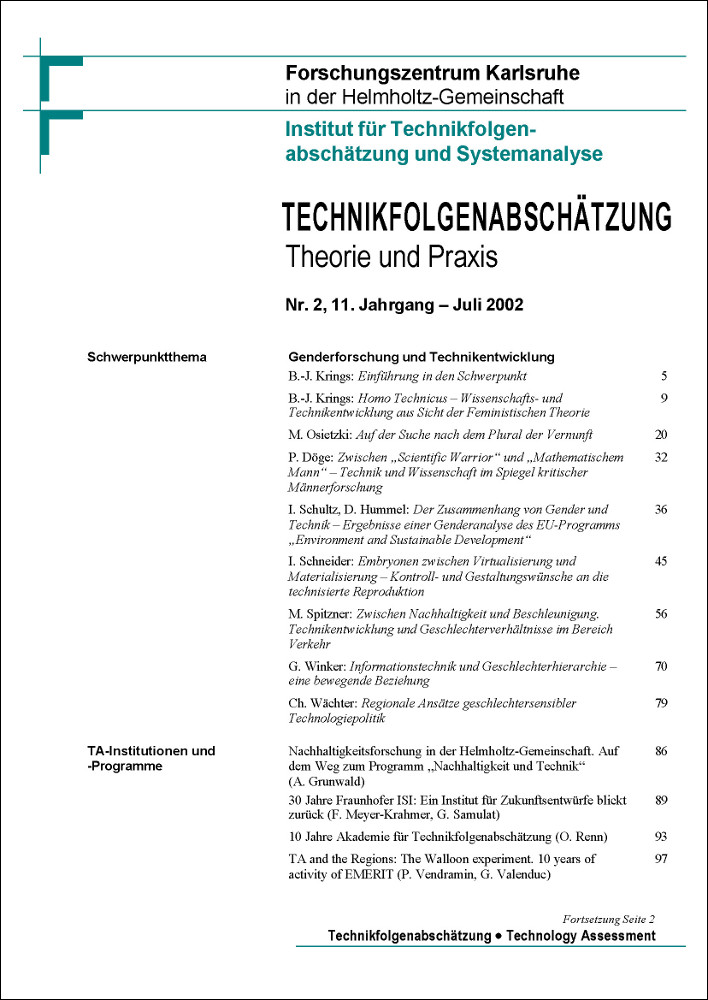The journal "Technikfolgenabschätzung" No. 2, 2002, with the main theme Genderforschung und Technikentwicklung, online available [26.07.2002]
The focal theme of this issue is devoted to "Gender Research and Technology Development". Gender research has also gained in importance in politics over the last years. Following an introduction into the concept of gender, the theme is developed in eight articles. Four of them deal with the theoretical and conceptual approaches to gender research, the other four focus on gender aspects in specific technology fields. In the first article, the technology debate is presented within the framework of feminist theory (Bettina-Johanna Krings, ITAS). Using the example of the early history of the "general systems theory" (Bertalanffy) which presently is one of the leading epistemological scientific practices, the "historical nature (Historizität) of this heritage is shown -- and thus its fundamental conversion -- by identifying alternative development options (Maria Osietzky, University of Bochum). Peter Döge, Institute for user-oriented Innovation and Future Research (Berlin), analyses the cultural "Leitbilder" of technology development which are revived precisely with regard to reproductive technologies. A Gender Impact Analysis (GIA) of the subprogramme "Environment and Sustainable Development" of the Fifth Framework Programme of the EU identifies the gender relevant factors of the European environment and sustainability research activities and outlines the conditions for taking greater account of the social, gender specific factors in research (Irmard Schulz and Diana Hummel, Institute for socio-ecological research, Frankfurt).
The articles of the second part are concerned with concrete fields of technology. Ingrid Schneider, University of Hamburg, focuses on reproductive technologies; Gabriele Winker, Technical University of Furtwangen, analyses information technology and the "hierarchy of gender"; Meike Spitzner, Wuppertal Institute, discusses technology development and gender relationships in the transport area. The last article by Christine Wächter, Interuniversity Research Centre for Technology, Work and Culture, Granz (Autria), presents the results of a research project aimed at setting up a catalogue of measures to increase the share of women in technical jobs.
In the TA Institutions section three institutions with major activities in the TA area reflect on their past on the occasion of thirty or ten years of existence respectively and sketch the perspectives for future work. These are the Fraunhofer Institute for Systems Technology and Innovation Research, the Academy for Technology Assessment in Baden-Württemberg, Stuttgart, as well as EMERIT (Experiments of mediation and evaluation in research and technological innovation) at the Fondation Travail-Universite in Namur, Belgium. In addition, the main lines of the future programme '"Sustainability and Technology" of the Helmholtz Gemeinschaft Deutscher Forschungszentren (HGF; Association of German Research Centres) are described in this section.
The TA Projects deal with robotics, electronic payment systems, and the opportunities and limits of internet based communication for technology debates.
In the Book Reviews section the results of an empirical country study on "Technology Assessment and the Economy" are presented which was performed by VDI Technology Centre Düsseldorf (M. Bruch, Allianz Zentrum für Technik). A critical analysis of scientific expert commissions by Jochen Luhmann, Wuppertal Institute, is based on a review of the report by the European Environmental Agency (EEA) "The Precautionary Principle in the 20th Century: Late Lessons from Early Warning".
The Conference Reports contain an article on a EU conference in May 2002 in Sevilla "prospectiva 2002", which focused on the role of "Foresight" in setting priorities for research policy. In addition, there is a report on the first Workshop (April 2002) of the German-Hungarian Working Group in Budapest "Shaping better technology".
Apart from the ITAS News which, as usual, point to more recent developments, projects, publications and events of ITAS, a new section is added, the "TAB News", where news from the Office of Technology Assessment at the German Parliament (TAB) are presented in brief. TAB is a special organisational unit of ITAS and has been run by the Research Centre Karlsruhe since 1990. The most important item of the TAB News in this issue is the decision of the Committee for Education, Research and Technology Assessment of the German Parliament, that TAB will continue to be run by ITAS for another period of five years (2003-2008).


